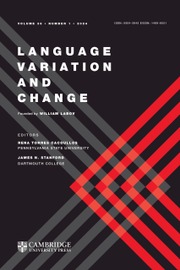Crossref Citations
This article has been cited by the following publications. This list is generated based on data provided by
Crossref.
Cameron, Richard
1993.
Ambiguous agreement, functional compensation, and nonspecifictúin the Spanish of San Juan, Puerto Rico, and Madrid, Spain.
Language Variation and Change,
Vol. 5,
Issue. 3,
p.
305.
Culy, Christopher
1996.
Null objects in English recipes.
Language Variation and Change,
Vol. 8,
Issue. 1,
p.
91.
Cameron, Richard
1996.
A community-based test of a linguistic hypothesis.
Language in Society,
Vol. 25,
Issue. 1,
p.
61.
Davidson, Brad
1996.
‘Pragmatic weight’ and Spanish subject pronouns: The pragmatic and discourse uses of ‘tú’ and ‘yo’ in spoken Madrid Spanish.
Journal of Pragmatics,
Vol. 26,
Issue. 4,
p.
543.
Bayley, Robert
and
Pease-Alvarez, Lucinda
1997.
Null pronoun variation in Mexican-descent children's narrative discourse.
Language Variation and Change,
Vol. 9,
Issue. 3,
p.
349.
PAIVA, Maria da Conceição de
and
SCHERRE, Maria Marta Pereira
1999.
Retrospectiva sociolingüística: contribuições do PEUL.
DELTA: Documentação de Estudos em Lingüística Teórica e Aplicada,
Vol. 15,
Issue. spe,
p.
201.
Martinez, Glenn
2007.
Writing back and forth: the interplay of form and situation in heritage language composition.
Language Teaching Research,
Vol. 11,
Issue. 1,
p.
31.
Travis, Catherine E.
2007.
Genre effects on subject expression in Spanish: Priming in narrative and conversation.
Language Variation and Change,
Vol. 19,
Issue. 02,
Lee, Duck-Young
and
Yonezawa, Yoko
2008.
The role of the overt expression of first and second person subject in Japanese.
Journal of Pragmatics,
Vol. 40,
Issue. 4,
p.
733.
McKee, Rachel
Schembri, Adam
McKee, David
and
Johnston, Trevor
2011.
Variable “subject” presence in Australian Sign Language and New Zealand Sign Language.
Language Variation and Change,
Vol. 23,
Issue. 3,
p.
375.
Travis, Catherine E.
and
Torres Cacoullos, Rena
2014.
Stress onI.
Studies in Language,
Vol. 38,
Issue. 2,
p.
360.
Torres Cacoullos, Rena
and
Travis, Catherine E.
2014.
Prosody, priming and particular constructions: The patterning of English first-person singular subject expression in conversation.
Journal of Pragmatics,
Vol. 63,
Issue. ,
p.
19.
2015.
Making Waves.
p.
194.
Nagy, Naomi
2015.
A sociolinguistic view of null subjects and VOT in Toronto heritage languages.
Lingua,
Vol. 164,
Issue. ,
p.
309.
Travis, Catherine E.
and
Lindstrom, Amy M.
2016.
Different registers, different grammars? Subject expression in English conversation and narrative.
Language Variation and Change,
Vol. 28,
Issue. 1,
p.
103.
2016.
Third Person References.
Vol. 71,
Issue. ,
Bayley, Robert
Greer, Kristen A.
and
Holland, Cory L.
2017.
Lexical frequency and morphosyntactic variation.
Spanish in Context,
Vol. 14,
Issue. 3,
p.
413.
WAGNER, SUSANNE
2018.
Never saw one – first-person null subjects in spoken English1.
English Language and Linguistics,
Vol. 22,
Issue. 01,
p.
1.
Travis, Catherine E.
and
Torres Cacoullos, Rena
2018.
Questioning theoretical primitives in linguistic inquiry.
Vol. 76,
Issue. ,
p.
67.
de Prada Pérez, Ana
2019.
Theoretical implications of research on bilingual subject production: The Vulnerability Hypothesis.
International Journal of Bilingualism,
Vol. 23,
Issue. 2,
p.
670.


